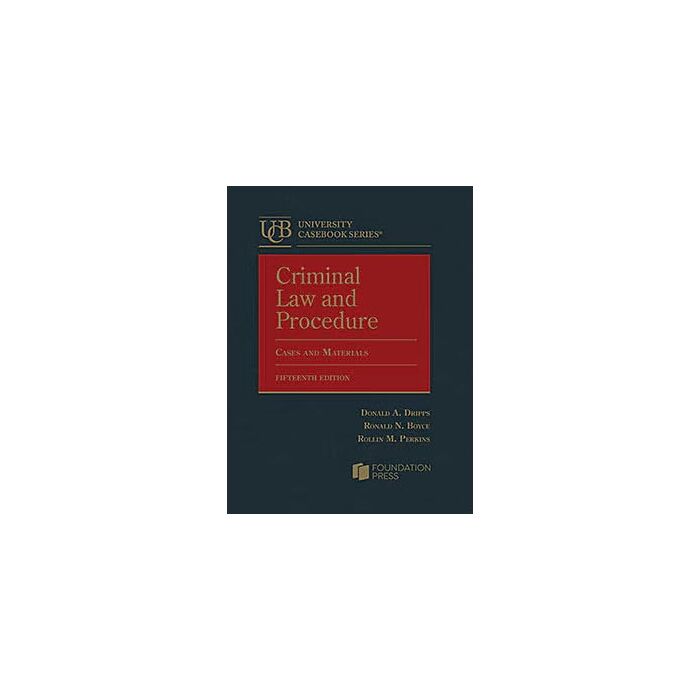Order by phone 1-866-808-5635 (M-F 10am - 4pm CST) Help/FAQs / LawRewards / Gift Certificates / Sell Us Your Law School Textbooks
-
Attorney
-
A-B
- A
- Accounting & Finance
- Administrative Law
- Admiralty Law
- Age & Gender Law
- Agency & Partnership Law
- Agricultural Law
- Alternative Dispute Resolution
- Animal Law
- Antitrust Law
- Appellate Advocacy
- Arbitration Law
- Art Law
- Audio Items
- Aviation & Space Law
- B
- Banking Law
- Bankruptcy Law
- Bar Exam Preparation
- Biotech Law
- Business Associations & Organizations
- Business Law
-
C-D
- C
- Civil Law
- Civil Procedure Law
- Civil Rights Law
- Class Action Law
- Commercial Law
- Commercial Paper
- Communications Law
- Community Property Law
- Comparative Law
- Conflict of Laws
- Constitutional Law
- Construction Law
- Consumer Law
- Contract Law
- Copyright Law
- Corporate Finance Law
- Corporate Tax Law
- Corporations Law
- Criminal Justice
- Criminal Law
- Criminal Procedure
- D
- Debtor-Creditor Law
- Defamation Law
- Disability Law
- Discrimination Law
- Divorce Law
- Domestic Relations Law
- Download Items
- Drug Law
-
E-F
- E
- Economics & Law
- Education Law
- Elder Law
- Election Law
- Employee Benefits & ERISA Law
- Employment Law
- Energy Law
- Entertainment Law
- Environmental Law
- Estate & Gift Tax Law
- Estates Law
- Evidence Law
- F
- Family Law
- Federal Courts & Jurisdiction
- Federal Income Tax Law
- Finance Law
- First Amendment Law
- First Year Law School Guides
- Flashcard Items
- Franchise Law
- Future Interests
-
G-J
- G
- Gambling Law
- General Legal Non-Fiction
- General Legal Reference
- Governmental Law
- Gun Law
- H
- Health & Health Care Law
- History & Law
- Housing Law
- Human Rights Law
- I
- Immigration Law
- Injunctions
- Insurance Law
- Intellectual Property Law
- International Business Transactions
- International Law
- Internet Law & Cyber Law
- J
- Jurisprudence
- Jury
- Juvenile Law
-
L-M
- L
- Labor Law
- Land Use Law
- Landlord & Tenant Law
- Law School Exam Guides
- Lawyering Skills
- Legal Career Guides
- Legal Dictionaries
- Legal Ethics
- Legal Malpractice
- Legal Philosophy
- Legal Practice Management
- Legal Research
- Legal Writing
- Legislation Law
- Litigation Law
- LSAT Exam Preparation
- M
- Maritime Law
- Mass Media Law
- Mediation Law
- Medical Liability Law
- Mergers & Acquisitions
- Military & Nat'l Security Law
- MPRE Exam Preparation
- Municipal Law
- Music Law
-
N-P
- N
- Native American Law
- Natural Resources Law
- Negotiable Instrument Law
- Non-Profit Organization Law
- O
- Oil & Gas Law
- P
- Partnerships & LLCs
- Paralegal Titles
- Patent Law
- Payment Systems Law
- Penal Law
- Personal Injury Law
- Pre-Law School Preparation
- Pre-Trial
- Privacy Law
- Probate Law
- Products Liability Law
- Professional Responsibility
- Property Law
-
R-Z
- R
- Real Estate Law
- Regulatory Law
- Religion & Law
- Remedies Law
- S
- Sales & Leases of Goods
- Secured Transactions
- Securities Regulation
- Sexual Orientation Law
- Software Items
- Sports Law
- T
- Transportation Law
- Tax Law
- Technology Law
- Tort Law
- Toxic Tort Law
- Trade Law
- Trademark Law
- Travel Law
- Trial Advocacy
- Trusts
- Trusts Law
- U
- U.C.C.
- W
- White Collar Crime
- Wills
- Z
- Zoning Law
-
A-B
-
Do-It-Yourself Law
-
A-B
- A
- Accounting & Finance
- Administrative Law
- Admiralty Law
- Age & Gender Law
- Agency & Partnership Law
- Alternative Dispute Resolution
- Animal Law
- Antitrust Law
- Appellate Advocacy
- Arbitration Law
- Art Law
- Audio Items
- Aviation Law
- B
- Banking Law
- Bankruptcy Law
- Bar Exam Preparation
- Biotech Law
- Business Associations & Organizations
- Business Law
-
C-D
- C
- Civil Procedure Law
- Civil Rights Law
- Class Action Law
- Commercial Law
- Commercial Paper
- Communications Law
- Community Property Law
- Comparative Law
- Conflict of Laws
- Constitutional Law
- Construction Law
- Consumer Law
- Contract Law
- Copyright Law
- Corporate Finance Law
- Corporate Tax Law
- Corporations Law
- Criminal Justice
- Criminal Law
- Criminal Procedure
- D
- Debtor-Creditor Law
- Disability Law
- Discrimination Law
- Divorce Law
- Domestic Relations Law
- Download Items
-
E-F
- E
- Economics & Law
- Education Law
- Elder Law
- Employee Benefits & ERISA Law
- Employment Law
- Energy Law
- Entertainment Law
- Environmental Law
- Estate & Gift Tax Law
- Estates Law
- Evidence Law
- F
- Family Law
- Federal Courts & Jurisdiction
- Federal Income Tax Law
- Finance Law
- First Amendment Law
- First Year Law School Guides
- Flashcard Items
- Franchise Law
- Future Interests
-
G-J
- G
- Gambling Law
- General Legal Non-Fiction
- General Legal Reference
- Governmental Law
- H
- Health & Health Care Law
- History & Law
- Human Rights Law
- I
- Immigration Law
- Injunctions
- Insurance Law
- Intellectual Property Law
- International Business Transactions
- International Law
- Internet Law & Cyber Law
- J
- Jurisprudence
- Juvenile Law
-
L-M
- L
- Labor Law
- Land Use Law
- Landlord & Tenant Law
- Law School Exam Guides
- Lawyering Skills
- Legal Career Guides
- Legal Dictionaries
- Legal Ethics
- Legal Philosophy
- Legal Practice Management
- Legal Research
- Legal Writing
- Legislation Law
- Litigation Law
- LSAT Exam Preparation
- M
- Maritime Law
- Mass Media Law
- Mediation Law
- Medical Liability Law
- Mergers & Acquisitions
- Military & Nat'l Security Law
- MPRE Exam Preparation
- Municipal Law
- Music Law
-
N-P
- N
- Native American Law
- Natural Resources Law
- Negotiable Instrument Law
- Non-Profit Organization Law
- O
- Oil & Gas Law
- P
- Partnerships & LLCs
- Patent Law
- Payment Systems Law
- Penal Law
- Personal Injury Law
- Pre-Law School Preparation
- Pre-Trial
- Privacy Law
- Probate Law
- Products Liability Law
- Professional Responsibility
- Property Law
-
R-Z
- R
- Real Estate Law
- Religion & Law
- Remedies Law
- S
- Sales & Leases of Goods
- Secured Transactions
- Securities Regulation
- Sexual Orientation Law
- Software Items
- Sports Law
- T
- Tax Law
- Technology Law
- Tort Law
- Toxic Tort Law
- Trade Law
- Trademark Law
- Travel Law
- Trial Advocacy
- Trusts
- Trusts Law
- U
- U.C.C.
- W
- White Collar Crime
- Wills
- Z
- Zoning Law
-
A-B
-
Law Student
-
A-B
- A
- Accounting & Finance
- Administrative Law
- Admiralty Law
- Age & Gender Law
- Agency & Partnership Law
- Agricultural Law
- Alternative Dispute Resolution
- Animal Law
- Antitrust Law
- Appellate Advocacy
- Arbitration Law
- Art Law
- Audio Items
- Aviation & Space Law
- B
- Banking Law
- Bankruptcy Law
- Bar Exam Preparation
- Biotech Law
- Business Associations & Organizations
- Business Law
-
C-D
- C
- Civil Law
- Civil Procedure Law
- Civil Rights Law
- Class Action Law
- Commercial Law
- Commercial Paper
- Communications Law
- Community Property Law
- Comparative Law
- Conflict of Laws
- Constitutional Law
- Construction Law
- Consumer Law
- Contract Law
- Copyright Law
- Corporate Finance Law
- Corporate Tax Law
- Corporations Law
- Criminal Justice
- Criminal Law
- Criminal Procedure
- D
- Debtor-Creditor Law
- Defamation Law
- Disability Law
- Discrimination Law
- Divorce Law
- Domestic Relations Law
- Download Items
- Drug Law
-
E-F
- E
- Economics & Law
- Education Law
- Elder Law
- Election Law
- Employee Benefits & ERISA Law
- Employment Law
- Energy Law
- Entertainment Law
- Environmental Law
- Estate & Gift Tax Law
- Estates Law
- Evidence Law
- F
- Family Law
- Federal Courts & Jurisdiction
- Federal Income Tax Law
- Finance Law
- First Amendment Law
- First Year Law School Guides
- Flashcard Items
- Franchise Law
- Future Interests
-
G-J
- G
- Gambling Law
- General Legal Non-Fiction
- General Legal Reference
- Governmental Law
- Gun Law
- H
- Health & Health Care Law
- History & Law
- Human Rights Law
- Housing Law
- I
- Immigration Law
- Injunctions
- Insurance Law
- Intellectual Property Law
- International Business Transactions
- International Law
- Internet Law & Cyber Law
- J
- Jurisprudence
- Jury
- Juvenile Law
-
L-M
- L
- Labor Law
- Land Use Law
- Landlord & Tenant Law
- Law School Exam Guides
- Lawyering Skills
- Legal Career Guides
- Legal Dictionaries
- Legal Ethics
- Legal Malpractice
- Legal Philosophy
- Legal Practice Management
- Legal Research
- Legal Writing
- Legislation Law
- Litigation Law
- LSAT Exam Preparation
- M
- Maritime Law
- Mass Media Law
- Mediation Law
- Medical Liability Law
- Mergers & Acquisitions
- Military & Nat'l Security Law
- MPRE Exam Preparation
- Municipal Law
- Music Law
-
N-P
- N
- Native American Law
- Natural Resources Law
- Negotiable Instrument Law
- Non-Profit Organization Law
- O
- Oil & Gas Law
- P
- Paralegal Titles
- Partnerships & LLCs
- Patent Law
- Payment Systems Law
- Penal Law
- Personal Injury Law
- Pre-Law School Preparation
- Pre-Trial
- Privacy Law
- Probate Law
- Products Liability Law
- Professional Responsibility
- Property Law
-
R-Z
- R
- Real Estate Law
- Regulatory Law
- Religion & Law
- Remedies Law
- S
- Sales & Leases of Goods
- Secured Transactions
- Securities Regulation
- Sexual Orientation Law
- Software Items
- Sports Law
- T
- Tax Law
- Technology Law
- Tort Law
- Toxic Tort Law
- Trade Law
- Trademark Law
- Transportation Law
- Travel Law
- Trial Advocacy
- Trusts
- Trusts Law
- U
- U.C.C.
- W
- White Collar Crime
- Wills
- Z
- Zoning Law
-
A-B
-
Paralegal
-
A-B
- A
- Accounting & Finance
- Administrative Law
- Admiralty Law
- Age & Gender Law
- Agency & Partnership Law
- Alternative Dispute Resolution
- Animal Law
- Antitrust Law
- Appellate Advocacy
- Arbitration Law
- Art Law
- Audio Items
- Aviation Law
- B
- Banking Law
- Bankruptcy Law
- Bar Exam Preparation
- Biotech Law
- Business Associations & Organizations
- Business Law
-
C-D
- C
- Civil Procedure Law
- Civil Rights Law
- Class Action Law
- Commercial Law
- Commercial Paper
- Communications Law
- Community Property Law
- Comparative Law
- Conflict of Laws
- Constitutional Law
- Construction Law
- Consumer Law
- Contract Law
- Copyright Law
- Corporate Finance Law
- Corporate Tax Law
- Corporations Law
- Criminal Justice
- Criminal Law
- Criminal Procedure
- D
- Debtor-Creditor Law
- Disability Law
- Discrimination Law
- Divorce Law
- Domestic Relations Law
- Download Items
-
E-F
- E
- Economics & Law
- Education Law
- Elder Law
- Employee Benefits & ERISA Law
- Employment Law
- Energy Law
- Entertainment Law
- Environmental Law
- Estate & Gift Tax Law
- Estates Law
- Evidence Law
- F
- Family Law
- Federal Courts & Jurisdiction
- Federal Income Tax Law
- Finance Law
- First Amendment Law
- First Year Law School Guides
- Flashcard Items
- Franchise Law
- Future Interests
-
G-J
- G
- Gambling Law
- General Legal Non-Fiction
- General Legal Reference
- Governmental Law
- H
- Health & Health Care Law
- History & Law
- Human Rights Law
- I
- Immigration Law
- Injunctions
- Insurance Law
- Intellectual Property Law
- International Business Transactions
- International Law
- Internet Law & Cyber Law
- J
- Jurisprudence
- Juvenile Law
-
L-M
- L
- Labor Law
- Land Use Law
- Landlord & Tenant Law
- Law School Exam Guides
- Lawyering Skills
- Legal Career Guides
- Legal Dictionaries
- Legal Ethics
- Legal Philosophy
- Legal Practice Management
- Legal Research
- Legal Writing
- Legislation Law
- Litigation Law
- LSAT Exam Preparation
- M
- Maritime Law
- Mass Media Law
- Mediation Law
- Medical Liability Law
- Mergers & Acquisitions
- Military & Nat'l Security Law
- MPRE Exam Preparation
- Municipal Law
- Music Law
-
N-P
- N
- Native American Law
- Natural Resources Law
- Negotiable Instrument Law
- Non-Profit Organization Law
- O
- Oil & Gas Law
- P
- Partnerships & LLCs
- Patent Law
- Payment Systems Law
- Penal Law
- Personal Injury Law
- Pre-Law School Preparation
- Pre-Trial
- Privacy Law
- Probate Law
- Products Liability Law
- Professional Responsibility
- Property Law
-
R-Z
- R
- Real Estate Law
- Religion & Law
- Remedies Law
- S
- Sales & Leases of Goods
- Secured Transactions
- Securities Regulation
- Sexual Orientation Law
- Software Items
- Sports Law
- T
- Tax Law
- Technology Law
- Tort Law
- Toxic Tort Law
- Trade Law
- Trademark Law
- Travel Law
- Trial Advocacy
- Trusts
- Trusts Law
- U
- U.C.C.
- W
- White Collar Crime
- Wills
- Z
- Zoning Law
-
A-B
-
Pre-Law Student
-
A-B
- A
- Accounting & Finance
- Administrative Law
- Admiralty Law
- Age & Gender Law
- Agency & Partnership Law
- Alternative Dispute Resolution
- Animal Law
- Antitrust Law
- Appellate Advocacy
- Arbitration Law
- Art Law
- Audio Items
- Aviation Law
- B
- Banking Law
- Bankruptcy Law
- Bar Exam Preparation
- Biotech Law
- Business Associations & Organizations
- Business Law
-
C-D
- C
- Civil Procedure Law
- Civil Rights Law
- Class Action Law
- Commercial Law
- Commercial Paper
- Communications Law
- Community Property Law
- Comparative Law
- Conflict of Laws
- Constitutional Law
- Construction Law
- Consumer Law
- Contract Law
- Copyright Law
- Corporate Finance Law
- Corporate Tax Law
- Corporations Law
- Criminal Justice
- Criminal Law
- Criminal Procedure
- D
- Debtor-Creditor Law
- Disability Law
- Discrimination Law
- Divorce Law
- Domestic Relations Law
- Download Items
-
E-F
- E
- Economics & Law
- Education Law
- Elder Law
- Employee Benefits & ERISA Law
- Employment Law
- Energy Law
- Entertainment Law
- Environmental Law
- Estate & Gift Tax Law
- Estates Law
- Evidence Law
- F
- Family Law
- Federal Courts & Jurisdiction
- Federal Income Tax Law
- Finance Law
- First Amendment Law
- First Year Law School Guides
- Flashcard Items
- Franchise Law
- Future Interests
-
G-J
- G
- Gambling Law
- General Legal Non-Fiction
- General Legal Reference
- Governmental Law
- H
- Health & Health Care Law
- History & Law
- Human Rights Law
- I
- Immigration Law
- Injunctions
- Insurance Law
- Intellectual Property Law
- International Business Transactions
- International Law
- Internet Law & Cyber Law
- J
- Jurisprudence
- Juvenile Law
-
L-M
- L
- Labor Law
- Land Use Law
- Landlord & Tenant Law
- Law School Exam Guides
- Lawyering Skills
- Legal Career Guides
- Legal Dictionaries
- Legal Ethics
- Legal Philosophy
- Legal Practice Management
- Legal Research
- Legal Writing
- Legislation Law
- Litigation Law
- LSAT Exam Preparation
- M
- Maritime Law
- Mass Media Law
- Mediation Law
- Medical Liability Law
- Mergers & Acquisitions
- Military & Nat'l Security Law
- MPRE Exam Preparation
- Municipal Law
- Music Law
-
N-P
- N
- Native American Law
- Natural Resources Law
- Negotiable Instrument Law
- Non-Profit Organization Law
- O
- Oil & Gas Law
- P
- Partnerships & LLCs
- Patent Law
- Payment Systems Law
- Penal Law
- Personal Injury Law
- Pre-Law School Preparation
- Pre-Trial
- Privacy Law
- Probate Law
- Products Liability Law
- Professional Responsibility
- Property Law
-
R-Z
- R
- Real Estate Law
- Religion & Law
- Remedies Law
- S
- Sales & Leases of Goods
- Secured Transactions
- Securities Regulation
- Sexual Orientation Law
- Software Items
- Sports Law
- T
- Tax Law
- Technology Law
- Tort Law
- Toxic Tort Law
- Trade Law
- Trademark Law
- Travel Law
- Trial Advocacy
- Trusts
- Trusts Law
- U
- U.C.C.
- W
- White Collar Crime
- Wills
- Z
- Zoning Law
-
A-B
- Menu
- Account
-
Attorney
-
A-B
- A
- B
-
C-D
-
C
- Civil Law
- Civil Procedure Law
- Civil Rights Law
- Class Action Law
- Commercial Law
- Commercial Paper
- Communications Law
- Community Property Law
- Comparative Law
- Conflict of Laws
- Constitutional Law
- Construction Law
- Consumer Law
- Contract Law
- Copyright Law
- Corporate Finance Law
- Corporate Tax Law
- Corporations Law
- Criminal Justice
- Criminal Law
- Criminal Procedure
- D
-
C
-
E-F
- E
- F
-
G-J
- G
- H
- I
- J
-
L-M
- L
- M
-
N-P
- N
- O
- P
-
R-Z
- R
- S
- T
- U
- W
- Z
-
A-B
-
Do-It-Yourself Law
-
A-B
- A
- B
-
C-D
-
C
- Civil Procedure Law
- Civil Rights Law
- Class Action Law
- Commercial Law
- Commercial Paper
- Communications Law
- Community Property Law
- Comparative Law
- Conflict of Laws
- Constitutional Law
- Construction Law
- Consumer Law
- Contract Law
- Copyright Law
- Corporate Finance Law
- Corporate Tax Law
- Corporations Law
- Criminal Justice
- Criminal Law
- Criminal Procedure
- D
-
C
-
E-F
- E
- F
-
G-J
- G
- H
- I
- J
-
L-M
- L
- M
-
N-P
- N
- O
- P
-
R-Z
- R
- S
- T
- U
- W
- Z
-
A-B
-
Law Student
-
A-B
- A
- B
-
C-D
-
C
- Civil Law
- Civil Procedure Law
- Civil Rights Law
- Class Action Law
- Commercial Law
- Commercial Paper
- Communications Law
- Community Property Law
- Comparative Law
- Conflict of Laws
- Constitutional Law
- Construction Law
- Consumer Law
- Contract Law
- Copyright Law
- Corporate Finance Law
- Corporate Tax Law
- Corporations Law
- Criminal Justice
- Criminal Law
- Criminal Procedure
- D
-
C
-
E-F
- E
- F
-
G-J
- G
- H
- I
- J
-
L-M
- L
- M
-
N-P
- N
- O
- P
-
R-Z
- R
- S
- T
- U
- W
- Z
-
A-B
-
Paralegal
-
A-B
- A
- B
-
C-D
-
C
- Civil Procedure Law
- Civil Rights Law
- Class Action Law
- Commercial Law
- Commercial Paper
- Communications Law
- Community Property Law
- Comparative Law
- Conflict of Laws
- Constitutional Law
- Construction Law
- Consumer Law
- Contract Law
- Copyright Law
- Corporate Finance Law
- Corporate Tax Law
- Corporations Law
- Criminal Justice
- Criminal Law
- Criminal Procedure
- D
-
C
-
E-F
- E
- F
-
G-J
- G
- H
- I
- J
-
L-M
- L
- M
-
N-P
- N
- O
- P
-
R-Z
- R
- S
- T
- U
- W
- Z
-
A-B
-
Pre-Law Student
-
A-B
- A
- B
-
C-D
-
C
- Civil Procedure Law
- Civil Rights Law
- Class Action Law
- Commercial Law
- Commercial Paper
- Communications Law
- Community Property Law
- Comparative Law
- Conflict of Laws
- Constitutional Law
- Construction Law
- Consumer Law
- Contract Law
- Copyright Law
- Corporate Finance Law
- Corporate Tax Law
- Corporations Law
- Criminal Justice
- Criminal Law
- Criminal Procedure
- D
-
C
-
E-F
- E
- F
-
G-J
- G
- H
- I
- J
-
L-M
- L
- M
-
N-P
- N
- O
- P
-
R-Z
- R
- S
- T
- U
- W
- Z
-
A-B
Order by phone 1-866-808-5635 (M-F 9am-5pm CST)
Criminal Law and Procedure: Cases and Materials (University Casebook Series)
- Edition : 15th ed., 2025
- Author(s) : Dripps, Boyce, Perkins
Log in or create an account to get 293 LawReward points on this purchase!
-
Criminal Law and Procedure: Cases and Materials (University Casebook Series)
- ISBN: 9798892097154
- SKU: 93025
- Condition: New
- Format: Hardcover
$292.80
List Price: $305.00
- Order now and this item SHIPS TODAY!
-
Criminal Law and Procedure: Cases and Materials (University Casebook Series) (Used)
- ISBN: 9798892097154
- SKU: 93025U
- Condition: Used
- Format: Hardcover
- No more than 25% of the total pages in the book have writing or highlighting and existing writing and highlighting does not obscure text.
- All bindings are intact, with no split bindings.
-
Criminal Law and Procedure: Cases and Materials (University Casebook Series) (Instant Digital Access Code Only)
- SKU: 93025E
- Format: Digital Access Code Only
- Instant Access!
-
Criminal Law and Procedure: Cases and Materials (University Casebook Series) (Rental)
- ISBN: 9798892097154
- SKU: 93025R
- Condition: New
- Format: Hardcover
- Order now and this item SHIPS TODAY!
- A pristine, unused rental copy of the textbook (which must be returned by the end of your course semester), with no highlighting or writing restrictions,
- Immediate, lifetime access to the digital copy of that edition of the textbook, and
- Access to the Interactive Study Center where you can utilize outlining tools, self-assessment tools that will show you your strengths and weaknesses, and online study aids including curated excerpts and practice questions from leading study aids such as Examples & Explanations and Glannon Guides.
What condition are our used books in?
We offer only high‐quality used textbooks.
All of the used textbooks that we offer adhere to the following quality standards:
If you have any question about any used textbook for sale on our website, please call us at 1‐866‐808‐5635 (M‐F 10am‐4pm CST) and we may be able to inspect the books for you prior to purchase.
What is a Connected Casebook?
In an effort to offer more affordable, and powerful, law school textbook options to law students, Aspen Publishers/Wolters Kluwer Legal Education is now offering Connected Casebook versions of some of their textbook titles. With Connected Casebook versions, you get all of this:
What is the benefit of a Connected Casebook?
With Connected Casebook titles, you really do get more for less! Connected Casebook items are discounted up to 25% off of the price of their respective non-Connected Casebook versions.
Want more info on Connected Casebook? Click here!
The 15th Edition continues the book's commitment to offering the most comprehensive, rigorous, and flexible materials on the American criminal process. With respect to the substantive criminal law, the new edition includes:
- Full case treatment of new cases from the Supreme Court, including City of Grants Pass, Oregon v. Johnson, 144 S.Ct. 2202 (2024) (rejecting an Eighth Amendment challenge to an ordinance prohibiting sleeping in public), Ruan v. United States, 597 U.S. 450 (2022) (requiring proof of scienter to convict a doctor of felony drug trafficking), and Ramos v. Louisiana, 590 U.S. 83 (2020) (holding that the Fourteenth Amendment incorporates not just the Sixth Amendment right to jury trial, but also the requirement that the jury be unanimous to convict), together with a much-condensed presentation of Dobbs v. Jackson Women's Health Organization, 597 U.S. 215 (2022) (Roe is overruled; what now about Lawrence?);
- Important new lower courts cases on the void-for-vagueness doctrine, the Second Amendment, homicide, and insanity;
- An update to the causation section;
- The addition, to Chapter 11, of a brief new Section 6 on Executive Clemency;
- A focus on cases that reflect topical issues, including homelessness, gun rights, reproductive rights, drug sales causing death, and parental liability for mass shootings by their minor children;
- A pervasive effort to condense material, either by cutting some material from cases as they appeared in the Fourteenth Edition, or substituting newer and shorter cases for older and longer ones.
Get INSTANT ACCESS to Criminal Law and Procedure: Cases and Materials (University Casebook Series)! Purchase this digital-only eBook version and your access code will be delivered to you in your order confirmation email which you will receive immediately after your order is placed.
The 15th Edition continues the book's commitment to offering the most comprehensive, rigorous, and flexible materials on the American criminal process. With respect to the substantive criminal law, the new edition includes:
- Full case treatment of new cases from the Supreme Court, including City of Grants Pass, Oregon v. Johnson, 144 S.Ct. 2202 (2024) (rejecting an Eighth Amendment challenge to an ordinance prohibiting sleeping in public), Ruan v. United States, 597 U.S. 450 (2022) (requiring proof of scienter to convict a doctor of felony drug trafficking), and Ramos v. Louisiana, 590 U.S. 83 (2020) (holding that the Fourteenth Amendment incorporates not just the Sixth Amendment right to jury trial, but also the requirement that the jury be unanimous to convict), together with a much-condensed presentation of Dobbs v. Jackson Women's Health Organization, 597 U.S. 215 (2022) (Roe is overruled; what now about Lawrence?);
- Important new lower courts cases on the void-for-vagueness doctrine, the Second Amendment, homicide, and insanity;
- An update to the causation section;
- The addition, to Chapter 11, of a brief new Section 6 on Executive Clemency;
- A focus on cases that reflect topical issues, including homelessness, gun rights, reproductive rights, drug sales causing death, and parental liability for mass shootings by their minor children;
- A pervasive effort to condense material, either by cutting some material from cases as they appeared in the Fourteenth Edition, or substituting newer and shorter cases for older and longer ones.
Related Products
-
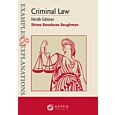
Examples & Explanations: Criminal Law
List Price $77.95 Our Low Price $74.83 -
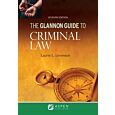
The Glannon Guide to Criminal Law
List Price $68.95 Our Low Price $66.19 -
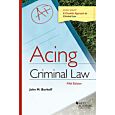
Acing Criminal Law
List Price $55.00 Our Low Price $52.80 -
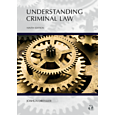
Understanding Series: Understanding Criminal Law
List Price $55.00 Our Low Price $52.80

